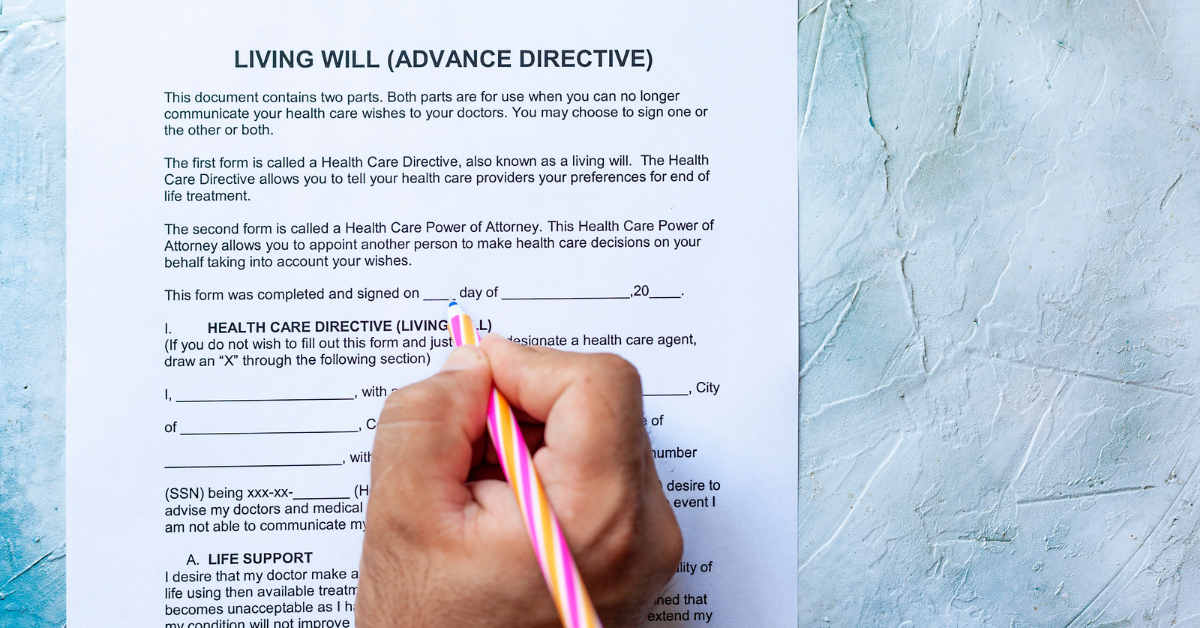What Are Advance Healthcare Directives and Why Do I Need Them?
July 23, 2021
What Are Advance Healthcare Directives and Why Do I Need Them?
July 23, 2021
Share this post:
Last Updated: February 14, 2024
 Preparing for end-of-life care and decisions is uncomfortable and can feel morbid. Still, preparation can ultimately be a comfort to you and your family if and when the time comes to carry out those directives. The U.S. population continues to age, and medical innovations are prolonging lifespans. This means that almost everyone will experience making end-of-life medical decisions—for themselves or someone they love—at some point in their life. We plan for many life events, like marriage, having children, college, and retirement, but many people reel at the thought of planning for their medical care if they become ill. No one can deny these are incredibly important, often life-altering decisions—both for you and your family.
Preparing for end-of-life care and decisions is uncomfortable and can feel morbid. Still, preparation can ultimately be a comfort to you and your family if and when the time comes to carry out those directives. The U.S. population continues to age, and medical innovations are prolonging lifespans. This means that almost everyone will experience making end-of-life medical decisions—for themselves or someone they love—at some point in their life. We plan for many life events, like marriage, having children, college, and retirement, but many people reel at the thought of planning for their medical care if they become ill. No one can deny these are incredibly important, often life-altering decisions—both for you and your family.
Here’s what you need to know about advanced healthcare directives.
What Are Advanced Healthcare Directives?
While estate planning can primarily focus on finances, specifically, protecting one’s assets and ensuring that priceless heirlooms and property are entrusted to the right people, one of the most important aspects of estate planning pertains to healthcare. If you cannot make medical decisions for yourself, an advanced healthcare directive or AHCD allows you to appoint a healthcare agent, thus giving them the legal authority to make medical decisions on your behalf. Typically, this “healthcare proxy” or “durable power of attorney for health care” are spouses, family members, or close friends but can be anyone else you feel will ensure that your wishes and expectations are met.
In grave conditions, an AHCD allows you to state your treatment wishes regarding specific medical scenarios, such as permanent unconsciousness or a terminal illness. An AHCD may also include language that indicates your wishes on prolonging life and requests for pain relief. Depending on personal choice, these statements ensure that one’s dignity and wishes will remain intact should one be nearing the end of life. Should one enter critical condition, an AHCD allows them to determine if they wish to be resuscitated, designate if you wish to donate your organs, and instruct on the disposition of your remains (typically cremation or burial).
Living wills are legal documents containing your medical wishes in writing, including what kinds of treatments and care you want in certain situations—typically, emergency, life-threatening, or end-of-life situations. Do you want CPR to be performed if necessary? Do you want to be hooked up to a feeding tube or respirator? Do you want blood transfusions?
A durable power of attorney for health care allows you to appoint someone to make medical decisions on your behalf if you are physically incapacitated or incapable of communicating or making decisions for yourself. This type of power of attorney does not apply to financial or legal decisions. A durable power of attorney can be appointed in conjunction with a living will creation, but a living will is unnecessary to carry out your wishes with a power of attorney.
A do-not-resuscitate (DNR) order indicates that you do not wish to be resuscitated in the event of cardiac or respiratory arrest. Having a DNR order in your medical records can reduce confusion for your medical team and family in life-threatening situations. A do not intubate (DNI) order indicates you do not want to be intubated or put on a respiratory machine.
Comfort or palliative care at the end of life is another important consideration. This can include limiting medical testing and medicine distribution for pain, nausea, and other medical symptoms and conditions.
Organ and tissue donation is another critical decision that can be included in an advanced directive. This may be indicated on your driver’s license, a donation card, or online registry and/or as part of your advanced healthcare directives.
Who Needs Advanced Healthcare Directives?
An accident or serious illness can happen to anyone at any time, which means every adult should have their healthcare directives outlined and, ideally, have discussions with your loved ones and the relevant parties who may be involved with making decisions on your behalf.
How Do You Create Your Advanced Healthcare Directives?
You can create your advanced healthcare directives by obtaining a living will and/or durable power of attorney forms. Start the planning process by talking with your doctor about your health and the implications of different life-saving medical treatments and care in emergency or end-of-life situations. An attorney can certainly help but is not required to make these documents official. A lawyer can assist with the paperwork but don’t rely on them to provide medical information. Some states require your advance directives to be witnessed or notarized; ensure you know the requirements when preparing your documents. Provide copies of your directives to your family, healthcare providers, and your healthcare proxy, if applicable.
Many states have advanced directive forms available online. You can locate your state’s forms and other resources in your community here. If you split your time between multiple locations in different states, we advise you to complete each state’s applicable forms and keep copies in all locations.
What Are the Benefits of Advanced Healthcare Directives?
Emergency medical and end-of-life situations are stressful, no matter how prepared you are. Advanced healthcare directives may save your family from much strife regarding your healthcare, especially if disagreements arise whilst you are incapacitated. Advance healthcare directives can reduce your personal worry and increase your comfort level in emergency or end-of-life situations, decrease feelings of helplessness and guilt for your family, and save on overall healthcare costs by eliminating expensive medical services if these are not desired. Your personal wishes are clearly outlined, making them more likely to be honored, and you have delegated someone to be responsible for decision making; this provides clarity for your family and decreases the likelihood of conflict between family members. This also speeds up the decision-making and intervention time should life-saving measures be necessary.

Communicating Your Wishes
One of the most important aspects of advance care planning is communicating your wishes with your loved ones. Yes, it’s difficult, awkward, and upsetting, but leaving these decisions to your family in the midst of chaos and emotions can only amplify the heartache. Guilt, conflict, grief, and many other emotions can further complicate the decision-making process and aftereffects. Plan your medical directives now to save your family and other loved ones the negative effects of failing to do so later.
While planning for one’s death is inherently morbid, it is imperative that you start planning today. You can meet with an estate planning attorney to ensure that your wishes are carried out accordingly, no matter your age. Leaving life-altering decisions to family members while you are incapacitated can lead to potentially negative outcomes that you can avoid through the creation of advanced health care directives. While much of the document is tied up in the specifics of how you wish for things to be handled if a proxy must take over medical decision making in your place, the true focus of this document is to lay out what is most important to you. These decisions are highly personal and sensitive but can ease the pain and stress of your loved ones by protecting them from having to make harried decisions while wracked with emotions. Reducing the time, emotional, and financial burdens are arguably the most important benefits of creating an AHCD. The price for peace of mind can’t be understated.
If you want to learn about more personalized and advanced strategies, schedule a 15-minute call with our team.
Schedule Your Complimentary 15-Minute Call
Want expert retirement and investing advice? Subscribe to our YouTube channel and check out our weekly podcast with The Sandman!
Listen to Protect Your Assets anywhere you get your podcasts:
Standard Disclosure
This blog expresses the author’s views as of the date indicated, are subject to change without notice, and may not be updated. The information contained within is believed to be from reliable sources. However, its accurateness, completeness, and the opinions based thereon by the author are not guaranteed – no responsibility is assumed for omissions or errors. This blog aims to expose you to ideas and financial vehicles that may help you work towards your financial goals. No promises or guarantees are made that you will accomplish such goals. Past performance is no guarantee of future results, and any expected returns or hypothetical projections may not reflect actual future performance or outcomes. All investments involve risk and may lose money. Nothing in this document should be construed as investment, tax, financial, accounting, or legal advice. Each prospective investor must evaluate and investigate any investments considered or any investment strategies or recommendations described herein (including the risks and merits thereof), seek professional advice for their particular circumstances, and inform themselves about the tax or other consequences of any investments or services considered. Investment advisory services are offered through Liberty Wealth Management, LLC (“LWM”), DBA Liberty Group, an SEC-registered investment adviser. For additional information on LWM or its investment professionals, please visit www.adviserinfo.sec.gov or contact us directly at 411 30th Street, 2nd Floor, Oakland, CA 94609, T: 510-658-1880, F: 510-658-1886, www.libertygroupllc.com. Registration with the U.S. Securities and Exchange Commission or any state securities authority does not imply a certain level of skill or training.
References
https://www.nia.nih.gov/health/advance-care-planning-health-care-directives
https://nt.prophecyhealth.com/Docs/manuals/Advance_Care_Planning_Study_Manual_2016.pdf
